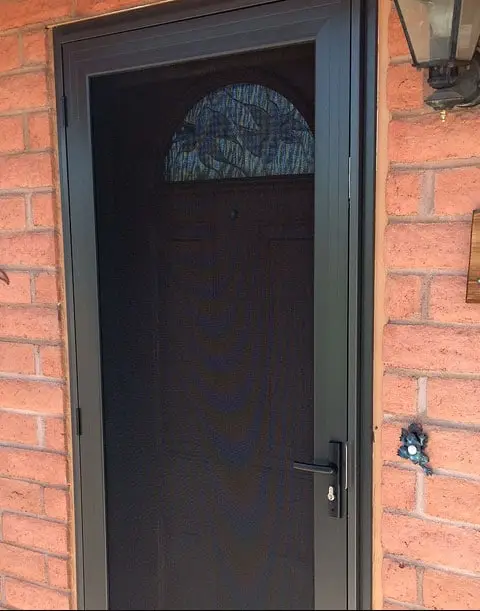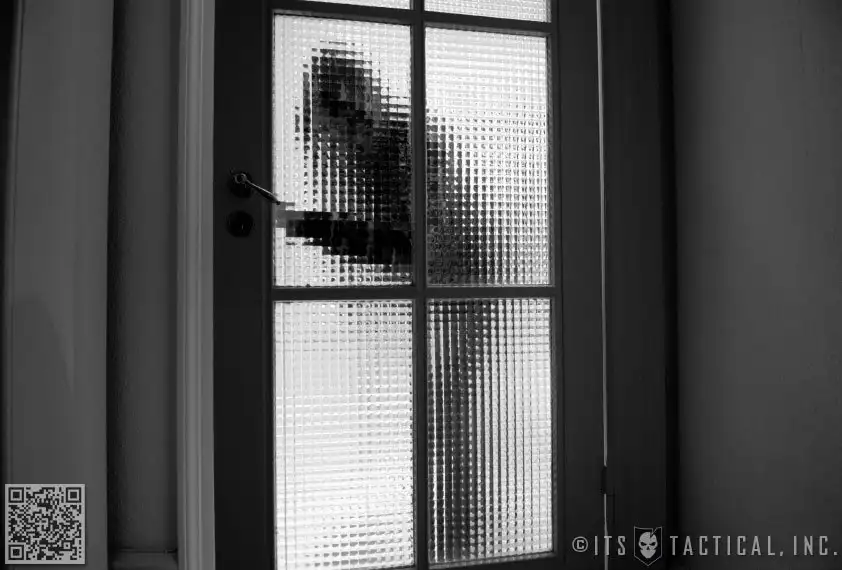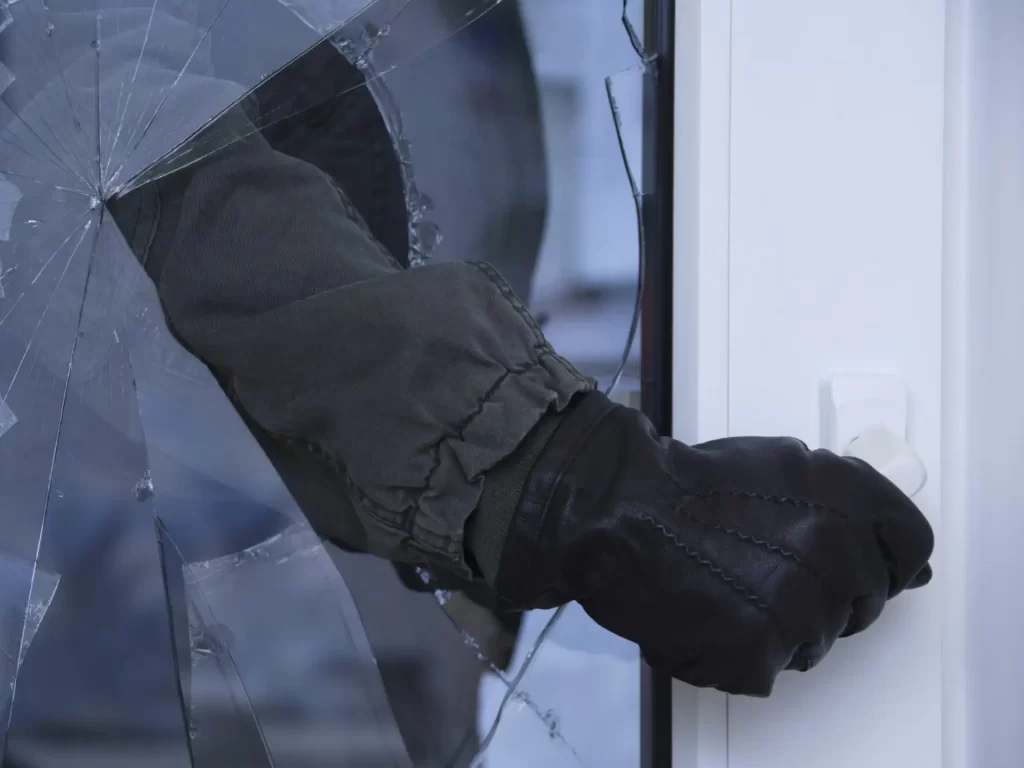- What is classed as a home invasion?
- First degree
- Second degree
- Third degree
- Crimes related to a home invasion
- Penalty for home invasion
- How do I defend against home invasion charges?
- Home invasion laws
- Home invasion robbery
- Penalties for home invasion robbery
- Home invasion vs. burglary
- Conclusion
Definition For Home Invasion – A Guide
According to a survey by SafeWise, property crime seems to be the most problematic of all. Close to 20% of Americans were distressed by the possibility of a home invasion. Despite that, 38% of Americans do not have any added security for their home.
Entering someone’s property without their permission is a violation (with or without the intent to commit a crime). Home invasion is maybe a burglary or trespass depending on the intent. It generally involves someone breaking into a home (not theirs) to commit a crime.
Lawmakers impose some of the harshest sentences on those committing a home invasion. This is because the invasion of privacy, both physical and digital, is frowned upon. And also due to the violent nature of the crime. The penalties for home invasion vary from state to state.
This article delves deep into the home invasion, penalties, and above all, the laws. We also intent this blog to clarify any doubts you may have regarding this.
Entering a property with the specific intent of committing a crime is called a home invasion. It is a type of robbery where the perpetrator breaks into a home while the occupants are still inside. The intent of home invasion can be:
- Robbery
- Theft
- Murder
- Sexual Assault
- Assault
- Kidnapping
- Any other crimes
Home invasions can be dangerous since the person enters either by stealth or force. As a result, there are high chances for conflict between the homeowner and the offender.
A good example is the Michigan home invasion case that happened in the Saginaw Bay area. The homeowner who walked in on a violent home invasion was shot three times by the perpetrator.
What is classed as a home invasion?
Home invasion involves breaking into the home that the perpetrator knows is occupied. To be charged with one, any of the following actions should apply:
- Causes serious injury to the person in the invaded home with or without a weapon or firearm
- Threatens force upon the person living in the home with or without a weapon
- Uses a weapon to harm an individual in the building
- Causes death to the person living there
- Commits sexual assault, rape, or any other sex crimes to any person in the building
In certain cases, a person can also be charged with home invasion for entering their own home. This is because his/her spouse can have a protection order issued against them. It is a violation of court order, and hence a home invasion. Courts impose severe consequences for the offenders convicted of a home invasion.
First degree
The offender is guilty of a first-degree home invasion if they carry a dangerous weapon.. And if another resident/tenant/homeowner is lawfully present in residence.
- They break and enter a dwelling without permission with the intent to commit a crime.
- They break and enter a dwelling without permission. And at any time during the process, they commit a crime on the property.
Note that the crime mentioned here may be theft, felony, or assault.
Second degree
A person commits a home invasion of the second degree when:
- He/she enters a dwelling without consent intending to commit a crime.
- He/she enters a dwelling without consent. And commits a crime at any time during the process while being on the property.
Note that the crime mentioned here may be theft, felony, or assault.
Third degree
When committing any of the below actions, you will be charged with home invasion in the third degree:
- Breaking or entering a residence without permission to commit a misdemeanor.
- Commit a misdemeanor between breaking in and exiting a residence.
- Violating the following when breaking or entering a residence without permission
- Personal protection order term
- Probation term
- Parole term
- Bond or bail condition
- Pretrial release condition

Crimes related to a home invasion
Home invasion is a pretty serious criminal charge in many states. And if found guilty, it carries severe penalties. Here are the crimes associated with a home invasion charge.
- Breaks and enters knowing that someone is present on the property.
- Armed with a dangerous weapon intending or threatening to use force
- Armed with a dangerous weapon and uses it
- Discharges a forearm
- Threatens or uses force
- Releases a firearm injuring, causing disability, disfigurement, or death to another person
- Commits rape, sexual abuse, or molests against any person on the property
Even if the prosecutor cannot prove the crimes above, it doesn’t mean that they cannot charge you. The prosecutor can still charge you with other crimes.
Trespass
You commit a trespass when you:
- Enter a property of another person in a conscious manner
- Enter with the intent of interfering with their business or well being
- Refuse to leave even if asked
- Enter a property intending to harm their occupants
Unauthorized entry
The law recognizes unauthorized entry as a home invasion, except that the offender doesn’t intend to commit a crime. It happens when you enter and stay on the property without permission from the occupant. The laws consider the crime aggravated if the resident is present at the time of entry.
Penalty for home invasion

Home invasion is a serious crime and has a high likelihood of prison sentence if convicted. However, the judge may consider the following when determining a proper sentence.
- Previous criminal record
- The gravity of the crime committed or intending to commit
- Occupants of the dwelling at the time of the crime
- Involvement of an accomplice
- Use of a dangerous weapon
If the prosecution can prove the criminal charges, you will be sentenced with:
- First Degree – 7 years to 21 years imprisonment for residential property. And 5-15 years for non-residential property
- Second degree – 2 years to 8.75 years imprisonment
- Third-degree – 1-3.75 years imprisonment
If the prosecution is unable to prove the charges, you may still be charged with misdemeanors.
- Trespassing – 6 months imprisonment and $2,500 in fines
- Unauthorized entry – 4 months imprisonment and up to $750 in fines
- Aggravated trespass – 18 months and up to $150,000 in fines
How do I defend against home invasion charges?

Not all allegations of home invasion are legitimate. Your lawyer will prepare for your defense by analyzing the circumstances surrounding your arrest. Your alleged criminal behavior will also help prepare for the defense. To prove your innocence, your lawyer may use the following defense strategy:
- Defendant has no plan of committing a crime. In this case, it would be a simple case of trespass.
- A person entered the property by mistake.
- The defendant was wrongfully identified as an offender.
- The structure didn’t resemble a residential property.
- Not an unlawful entry, or the defendant had permission to enter.
- False accusation.
- Wrong identification.
- Not enough evidence.
The court doesn’t take to people home invasion. The sentence is pretty severe if convicted, and you would spend some serious time behind bars. An experienced criminal defense attorney should:
- Build a case stressing why you are not guilty
- Get a plea bargain if convicted
- Reduce your sentence if convicted
Home invasion laws

A home invasion happens when people enter a building or vehicle with the intent to commit a crime. The home invasion law is divided into three code sections varying in severity. The first degree is the most severe offense and attracts a maximum penalty. A crime of home invasion requires proof of the following beyond reasonable doubt.
- First Degree: Defendant entered and remained on the property to commit a felony or theft. Between entry and exiting the property, the offender possessed a dangerous weapon, or firearm.
- Second Degree: Defendant entered the property intending to commit a crime(theft or felony).
- Third Degree: The offender entered the property by breaking in or force intending to commit a crime.
Every classification has a minimum sentence and a maximum sentence. The class is decided depending on the structure where the invasion happened. Other factors play a significant part in deciding the felony.
Home invasion robbery

Home invasion robbery is when someone enters a property to commit theft. More often than not, it involves threat, assault, and violence. A property here includes a residence of any kind such as:
- Condo
- House
- Apartment
- Hotel/Motel
Apart from that, the offender may also possess a dangerous weapon such as a firearm. Home invasion robbery is one of the most serious crimes in the eyes of criminal law. If a weapon was deployed, the charge attracts a maximum penalty.
Most offenders operate in groups and are unemployed males. They depend on the sudden burst of entry to create chaos. They gain control over the occupants soon enough. More often than not, they use deadly weapons in the process. The victims are often the elderly or those who live alone.
To prove the charges, the prosecutor should prove the following without reasonable doubt:
- Offender entered the dwelling with the occupants present
- Offender had the intention of robbing the people inside and/or also did so.

Penalties for home invasion robbery
Home invasion robbery happens when the defendant enters a property to commit a theft. Most states treat home invasion robberies as serious offenses. The penalty goes up depending on the offense and if the perpetrator has a weapon. Moreover, the prison term can go up if there are any aggravating factors present. For example, prior felony convictions.
Here are the charges and the prison terms. This is subject to change depending on the changes in the laws.
- Class 2 Felony – Up to 10 years imprisonment and/or up to $150,000 in fines
- Class 3 Felony – Up to 7 years imprisonment and/or up to $150,000 in fines
- Class 4 Felony – Up to 3 years in prison and/or up to $150,000 in fines
Home invasion vs. burglary

A burglary happens when someone enters the property intending to commit theft. It can be a residence, place of work, vehicle. Additionally, the offender may also commit battery or assault during the process.
In contrast, with a home invasion, the perpetrator enters a property without permission, often forcibly. The property should be occupied, but the homeowner or resident need not be there at the time of the offense.
In the eyes of the court, to prove burglary, the prosecutor requires proof that the offender had the intent to commit a crime. But in the case of home invasion, they require proof of forcible entry. However, both crimes are serious offenses. Therefore, they carry a heft sentence both in jail terms and fines.
Few states charge home invasions as first-degree burglary. At the same time, home invasion robbery is a first-degree felony. Hence, it is punishable and sentenced to thirty years imprisonment.
Conclusion

Home invasion, otherwise called residential burglary, is classed as a violent crime. And hence these cases are not brushed off by law enforcement. The prosecutors have to prove the specific intent of the charge of a home invasion beyond doubt. They will use everything, from witness statements to forensics, to prove their case. Home invasion cases often depend on the alleged victim to name the offender.
The guilty verdict from a home invasion conviction can hound you for ages to come. So, if you are charged with home invasion, robbery, or any other crime, consult with an experienced criminal defense attorney. Most of them offer a free consultation for your first meeting at least. Any confidential or sensitive information you share with your criminal defense lawyer is bound by the attorney-client relationship.






3 thoughts on “Definition For Home Invasion – A Guide”
Comments are closed.